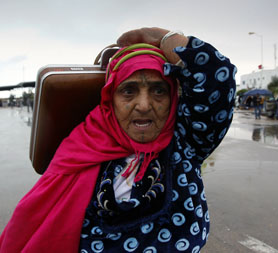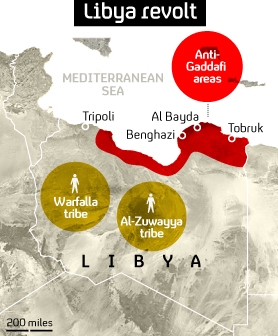Libya crisis: Gaddafi ‘on brink of losing power’
Thousands are trying to flee Libya amid fears of civil war. Colonel Gaddafi is losing his grip on power and will not be able to hold out for much longer, a Libya expert tells Channel 4 News.

Libya is descending into chaos. Colonel Gaddafi‘s hold on power is slipping, much of his country has already fallen to his opponents and he is isolated in the rest of the world.
Much of the western area around Tripoli is no longer under Gaddafi’s control, according to reports. There has been fighting in Misratah, with reports of violence in Zuwarah and Gharyan. A swathe of eastern Libya, including Tobruk and Benghazi are also in rebel hands.
The eastern city of Benghazi has seen celebrations with thousands out on the streets, setting off fireworks and condemning the Libyan leader.
Dr Imad El-Anis, a Libya specialist at Nottingham Trent University, told Channel 4 News that Gaddafi had lost control in most areas and his fate was now in the hands of Libya’s tribes, which hold the key as to how long he remains in power.
It seems the tribes are saying they’re unhappy with the use of force and mercenaries… Dr Imad El-Anis
“It seems the tribes are saying they’re unhappy with the use of force and mercenaries from Niger and Chad. Therefore they are not acting with the government. They are not yet saying they are openly against the government.
“But the longer there is violence, the tribes are going to be pushed further towards the protest movement camp. This would speed up the process of the regime coming down.”
The United States also said tonight it was considering sanctions against Libya.
Secretary of State Hillary Clinton said “everything” was on the table to bring about an end to the violence.
Channel 4 News special report – Arab revolt: Middle East uprisings
Watching events unfold in Libya has been difficult. Foreign journalists have been banned, and the regime has blocked phone and internet traffic. But some amateur video has been posted online.
Despite these difficulties with communications, it is clear that Gaddafi no longer holds sway in Libya’s east, where he has always been unpopular. The uprising against him began in Benghazi, a city of 700,000 people that has long rivalled the capital Tripoli.
At first, forces loyal to Gaddafi put down the protests here, but then switched their allegiance to the demonstrators.

In nearby Al-Bayda, also on the Mediterranean, there are reports that 26 people were killed by Gaddafi loyalists, with protesters attacked by tanks and aircraft. But Al-Bayda, too, is now in the hands of the rebels, along with Tobruk.
Gaddafi’s forces also appear to have abandoned the border with Egypt, which is now in the hands of men armed with clubs and Kalashnikovs who say they want to see the end of the Colonel’s rule.
The Warfalla tribe, which makes up one million of Libya’s six-million population, may be on the verge of changing sides. This week, leading members issued statements urging Gaddafi to leave Libya, but the tribe has not yet used its might to help to topple him.
Likewise, the Al-Zuwayya tribe, which has threatened to disrupt Libya’s oil fields in the east of the country.
From Our Correspondents
Channel 4 News International Editor Lindsey Hilsum in eastern Libya:
Every revolution has its Rambo, and we met ours just across the border. The Egyptian side had endless checkpoints manned by functionaries whose writ ran for the next 20 yards, before another demanded passports, press cards and a cursory glance into the glove compartment.
But once into Libya, the cast of characters changed.
Read more: Libya's revolution, and its Rambo
Channel 4 News Chief Correspondent Alex Thomson on Libya-Tunisia border:
Emerging from the final Libyan checkpoint, a steady stream of people walking across no-man's land, into a country which was the first in this "Arab Spring" to oust its dictator - Tunisia.
Read more: On the border as workers flee 'dangerous' Libya
Civil war
So is Libya on the verge of civil war, as the dictator’s son, Saif al-Islam Gaddafi, claimed in his television broadcast this week? Colonel Gaddafi said on Tuesday he was not going to leave Libya and would “die here as a martyr”.
Dr El-Anis believes what is happening in Libya could only be classed as civil war if there were prolonged conflict across the country, a scenario he considers unlikely.
“I believe we are in for a tough time, but I don’t think there will be civil war in Libya.” Gaddafi’s supporters were confined to Tripoli and were largely made up of 10-15,000 members of the security forces.
Mercenaries
Gaddafi has been using mercenaries from other African countries – reportedly Chad, Democratic Republic of Congo, Niger, Mali and Sudan – to do his dirty work. This has emboldened many of his critics, appalled by the brutality of the foreign troops.
In the video below, a man admits to anti-Gaddafi interrogators that he is a mercenary loyal to the dictator. He says he has two supporters from Chad with him and is told he is being taken to prison. Again, there is no independent verification.
Air strikes and heavy weapons
It is the extreme force used by the Libyan security forces that has caused so much international outrage. Witnesses have told Human Rights Watch that troops have been firing randomly at protesters, and Foreign Secretary William Hague has said he is concerned by reports that demonstrators have been targeted by snipers and heavy weapons fire.
There are also claims that people have been killed by air strikes, tanks and machine gun fire. Dr El-Anis is convinced these reports are accurate. He has seen pictures posted on blogs (now removed) showing the aftermath of what he believes to have been air strikes and firing from heavy artillery.
Air strikes had been aimed at airports and roads, he said, but “they have also targeted civilians, although not to the extent you might think from the mainsteam media”.
Dr El-Anis said these attacks appeared to have stopped now, possibly because of defections from the Libyan air force.
On Monday, two Libyan pilots flew their planes to Malta after disobeying orders to bomb protesters in the rebel stronghold of Benghazi. And today, Libya’s Quryna newspaper said a Libyan plane had crashed near Benghazi after its crew had bailed out. The newspaper said the crew had been under orders to bomb the city, but had refused to carry them out.
Military could be sent in to rescue UK nationals
Foreign Secretary William Hague has said that he will not rule out sending military flights into Libya – without permission – to pick up stranded Britons.
In a statement on Wednesday he said: “Our preference clearly is for people to be able to leave on commercial flights … or on our specially-arranged charter flights … rather than to send in military flights without permission, which is obviously riskier for the safety of all those involved,” Hague said in a televised statement.
“Although we don’t by any means rule out doing that.”
Two charter flights from Gatwick are due to arrive in Tripoli over night.
The Foreign Secretary told Channel 4 News: “We have positioned miltiary aircraft nearer to Libya. One way or another we’ll get people out of Tripoli.”
-
Latest news
-
India’s ‘YouTube election’: Influencers enlisted to mobilise youth vote6m

-
Putin denies plans to capture Ukrainian city of Kharkiv3m

-
Plaid Cymru ends co-operation agreement with Welsh Labour government4m

-
Infected blood scandal: Government was warned years before taking action6m

-
Displaced in Gaza have to ‘start from Zero’ many times over, says Gaza NGO director3m

-




